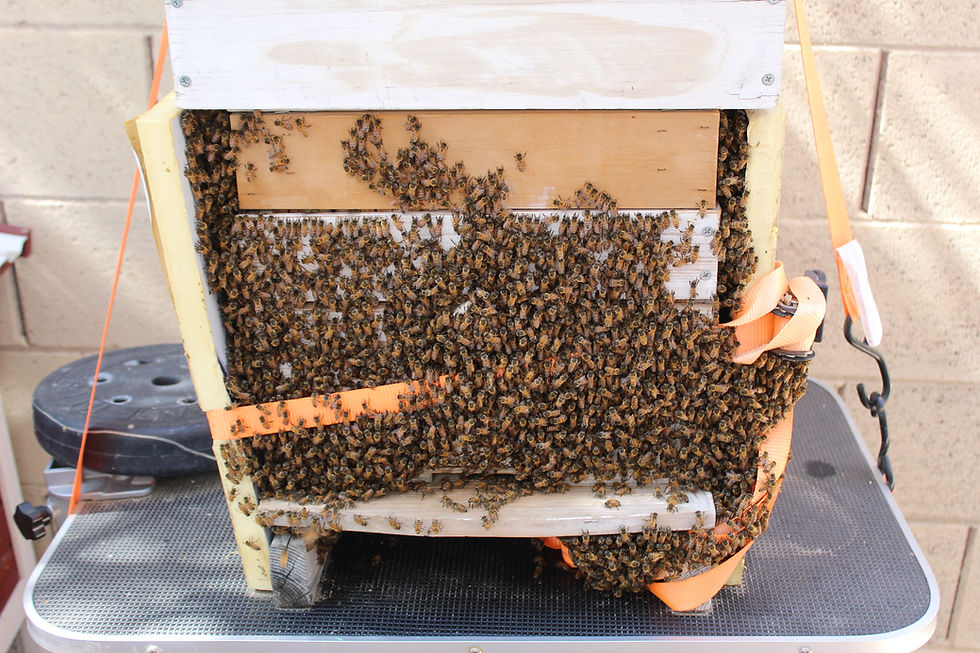Africanized Honey Bees: Nature's Blessing and Curse
- Pete Rizzo

- May 4, 2023
- 4 min read
Updated: Jan 13

Africanized Honey Bees: Buzzing Between Benefit and Bane
Honey Bees with a Twist
Once upon a time in the world of bees, a unique and controversial hybrid species was born - the Africanized honey bee. Known for their aggressive behavior and adaptability to various climates, these bees have been stirring up quite the buzz.
In this article, we'll delve into Africanized honey bee facts, explore their behavior, and discuss the benefits and challenges they pose to agriculture and the environment. So, let's dive into the fascinating world of these incredible insects.
The Sweet Side: Pros of Creating Africanized Honey Bees
Honey, Honey: Enhanced Honey Production
Africanized honey bees have an undeniable talent for producing honey. With a higher yield and more efficient foraging behavior, these bees are like tiny flying factories, churning out that sweet golden goodness we all know and love.
Super Bees: Increased Resistance to Diseases and Pests
These hybrid bees come with a built-in advantage: a stronger immune system. Africanized honey bees are less likely to fall victim to diseases, parasites, and pests like the dreaded Varroa mite, which can devastate entire bee colonies.
Climate Champs: Adaptability to Various Climates
Tropical and subtropical regions, rejoice! Africanized honey bees can thrive in a variety of climates, making them an asset to honey production in areas where traditional honey bees might not fare as well.
Genetic Superstars: Potential for Genetic Improvement
By selectively breeding Africanized honey bees with domesticated honey bees, we can potentially create new strains that possess the best of both worlds - higher honey production, better disease resistance, and more docile nature.

The Sting: Cons of Creating Africanized Honey Bees
Not So Friendly: Defensive Behavior
The dark side of Africanized honey bees is their defensive behavior. They're more likely to sting, posing a risk to beekeepers and the public and giving bees, in general, a bad rap.
Playing with Fire: Hybridization with Local Bee Populations
When Africanized honey bees mix with local bee populations, they can disrupt local ecosystems and displace native honey bee species. The result? A delicate balance of nature thrown out of whack.
Hard to Handle: Difficulty in Management and Containment
Containing the spread of Africanized honey bees is easier said than done. They've been known to travel beyond their intended areas, making it challenging to control their populations and mitigate the risks associated with their presence.
Pollination Problems: Potential Negative Impact on Pollination
Africanized honey bees can also impact pollination negatively. With reduced pollination efficiency, these bees may threaten biodiversity and various plant species' survival.
The Balancing Act: Making the Most of Africanized Honey Bees
Responsible Research and Management: Strategies for Success
Africanized honey bees come with their fair share of pros and cons, but with responsible research and management, we can learn from past experiences and mistakes. We can develop strategies to maximize the benefits while minimizing the risks associated with these remarkable creatures.
Continued Collaboration and Learning
As we explore the fascinating world of Africanized honey bees, it's crucial to engage in informed discussions and collaborate with stakeholders to ensure that we're making the best decisions for our ecosystems, our honey production, and our communities.
Safety Precautions and Coexistence
Understanding the history of Africanized honey bees in America and their behavior can help us take appropriate safety precautions when dealing with these bees.
By respecting their nature and knowing how to respond to potential threats, we can coexist with these insects while benefiting from their unique traits.

Conclusion: Harnessing the Buzz
So, there you have it - the sweet and the sting of the Africanized honey bee. As we continue to learn and adapt, we can hopefully find a way to harness the benefits of these remarkable insects while mitigating the risks.
By understanding the differences between African honey bees vs. European honey bees, implementing strategies for responsible Africanized honey bee research, and taking the necessary precautions, we can work together to protect our environment and our communities.
The buzzworthy world of bees has never been more fascinating! As we explore the pros and cons of creating Africanized honey bees, we can better appreciate the complexity of these creatures and the importance of finding a balance between their benefits and challenges.
Through informed discussions, collaboration, and responsible management, we can create a more sustainable and harmonious future for both humans and bees.
Betsy and Pete
Vegas Bees
Las Vegas, Nevada
About Us: The Authors

We're Betsy and Pete, passionate Las Vegas beekeepers trained by a master in the field. With hundreds of successful bee and bee swarm removals under our belts, we're not just experts; we're enthusiasts committed to the well-being of these incredible pollinators.
We manage dozens of beehives, both natural and honey-bearing at our Joshua Tree Preserve.
Our Commitment to Excellence
Education is an ongoing journey, especially in a dynamic field such as beekeeping. That's why we continually update our knowledge base, collaborate with other experts, and stay up to date with the latest advancements in bee control methods and beekeeping practices.
We also provide top-tier beekeeping supplies, offering everything a beekeeper needs, from beginners to experts.
.png)


